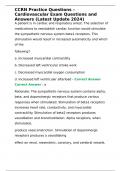Ccrn practice quest - Study guides, Class notes & Summaries
Looking for the best study guides, study notes and summaries about Ccrn practice quest? On this page you'll find 172 study documents about Ccrn practice quest.
Page 2 out of 172 results
Sort by
CCRN Practice Questions – Cardiovascular Exam Questions and Answers (Latest Update 2024)
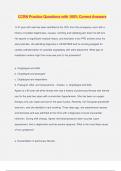
-
CCRN Practice Questions with 100% Correct Answers
- Exam (elaborations) • 113 pages • 2024
- Available in package deal
-
- $14.49
- + learn more
CCRN Practice Questions with 100% Correct Answers A 47-year-old male has been admitted to the CCU from the emergency room with a history of sudden diaphoresis, nausea, vomiting and radiating pain down his left arm. He reports no significant medical history, and has been a two PPD smoker since his early twenties. His admitting diagnosis is UA/NSTEMI and he is being prepped for cardiac catheterization for possible angioplasty with stent placement. What type of medication orders might the nur...
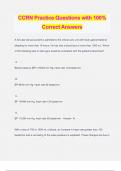
-
CCRN Practice Questions with 100% Correct Answers
- Exam (elaborations) • 158 pages • 2024
- Available in package deal
-
- $13.49
- + learn more
CCRN Practice Questions with 100% Correct Answers A 52-year-old accountant is admitted to the critical care unit with frank gastrointestinal bleeding for more than 18 hours. He has had a blood loss of more than 1000 mL. Which of the following sets of vital signs would be consistent with the patient's blood loss? A. Blood pressure (BP) 100/84 mm Hg, heart rate 124 beats/min B. BP 86/40 mm Hg, heart rate 92 beats/min C. BP 124/66 mm Hg, heart rate 124 beats/min D. BP 112/60 mm Hg, hea...
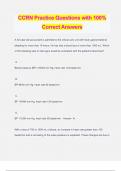
-
CCRN Practice Questions with 100% Correct Answers
- Exam (elaborations) • 158 pages • 2024
- Available in package deal
-
- $14.49
- + learn more
CCRN Practice Questions with 100% Correct Answers A 52-year-old accountant is admitted to the critical care unit with frank gastrointestinal bleeding for more than 18 hours. He has had a blood loss of more than 1000 mL. Which of the following sets of vital signs would be consistent with the patient's blood loss? A. Blood pressure (BP) 100/84 mm Hg, heart rate 124 beats/min B. BP 86/40 mm Hg, heart rate 92 beats/min C. BP 124/66 mm Hg, heart rate 124 beats/min D. BP 112/60 mm Hg, hea...
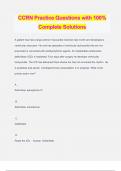
-
CCRN Practice Questions with 100% Complete Solutions
- Exam (elaborations) • 59 pages • 2024
- Available in package deal
-
- $13.49
- + learn more
CCRN Practice Questions with 100% Complete Solutions A patient has had a large anterior myocardial infarction last month and developed a ventricular aneurysm. He now has episodes of ventricular tachycardia that are not prevented or converted with antidysrhythmic agents. An implantable cardioverter- defibrillator (ICD) is implanted. Four days after surgery he develops ventricular tachycardia. The ICD has delivered three shocks but has not converted the rhythm. He is pulseless and apneic. C...
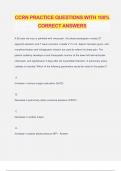
-
CCRN PRACTICE QUESTIONS WITH 100% CORRECT ANSWERS
- Exam (elaborations) • 63 pages • 2024
- Available in package deal
-
- $13.49
- + learn more
CCRN PRACTICE QUESTIONS WITH 100% CORRECT ANSWERS A 62-year-old man is admitted with chest pain. His electrocardiogram reveals ST segment elevation and T wave inversion in leads V1 to V4. Aspirin has been given, and morphine titration and nitroglycerin infusion are used to relieve his chest pain. The patient suddenly develops a loud holosystolic murmur at the lower left sternal border, chest pain, and hypotension 5 days after his myocardial infarction. A pulmonary artery catheter is inser...
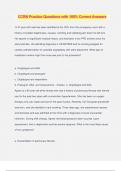
-
CCRN Practice Questions with 100% Correct Answers
- Exam (elaborations) • 113 pages • 2024
- Available in package deal
-
- $12.49
- + learn more
CCRN Practice Questions with 100% Correct Answers A 47-year-old male has been admitted to the CCU from the emergency room with a history of sudden diaphoresis, nausea, vomiting and radiating pain down his left arm. He reports no significant medical history, and has been a two PPD smoker since his early twenties. His admitting diagnosis is UA/NSTEMI and he is being prepped for cardiac catheterization for possible angioplasty with stent placement. What type of medication orders might the nur...
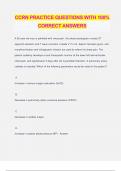
-
CCRN PRACTICE QUESTIONS WITH 100% CORRECT ANSWERS
- Exam (elaborations) • 63 pages • 2024
- Available in package deal
-
- $13.49
- + learn more
CCRN PRACTICE QUESTIONS WITH 100% CORRECT ANSWERS A 62-year-old man is admitted with chest pain. His electrocardiogram reveals ST segment elevation and T wave inversion in leads V1 to V4. Aspirin has been given, and morphine titration and nitroglycerin infusion are used to relieve his chest pain. The patient suddenly develops a loud holosystolic murmur at the lower left sternal border, chest pain, and hypotension 5 days after his myocardial infarction. A pulmonary artery catheter is inser...
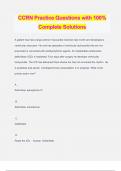
-
CCRN Practice Questions with 100% Complete Solutions
- Exam (elaborations) • 59 pages • 2024
- Available in package deal
-
- $13.49
- + learn more
pH 7.40, PaCO2 40 mm Hg, PaO2 62 mm Hg The case study shows stage II asthma. Option c shows stage III asthma. The patient is still breathing at a fast rate, but carbon dioxide is starting to be retained as evidenced by the increase of the PaCO2 into normal range. Options a and b are still stage II. Option d shows a respiratory alkalosis with a metabolic acidosis because you would have expected the pH to be in an alkalotic range with the PaCO2 of 30. A patient experiencing alcohol withdrawa...
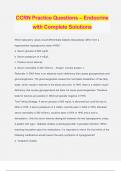
-
CCRN Practice Questions – Endocrine with Complete Solutions
- Exam (elaborations) • 29 pages • 2024
- Available in package deal
-
- $12.49
- + learn more
CCRN Practice Questions – Endocrine with Complete Solutions Which laboratory values would differentiate diabetic ketoacidosis (DKA) from a hyperosmolar hyperglycemic state (HHS)? a. Serum glucose of 600 mg/dL b. Serum potassium of 4 mEq/L c. Positive serum ketones d. Serum osmolality of 320 mOsm/L - Answer- Correct answer: c Rationale: In DKA there is an absolute insulin deficiency that causes glycogenolysis and gluconeogenesis. The gluconeogenesis causes the incomplete breakdown of f...

Study stress? For sellers on Stuvia, these are actually golden times. KA-CHING! Earn from your study resources too and start uploading now. Discover all about earning on Stuvia

